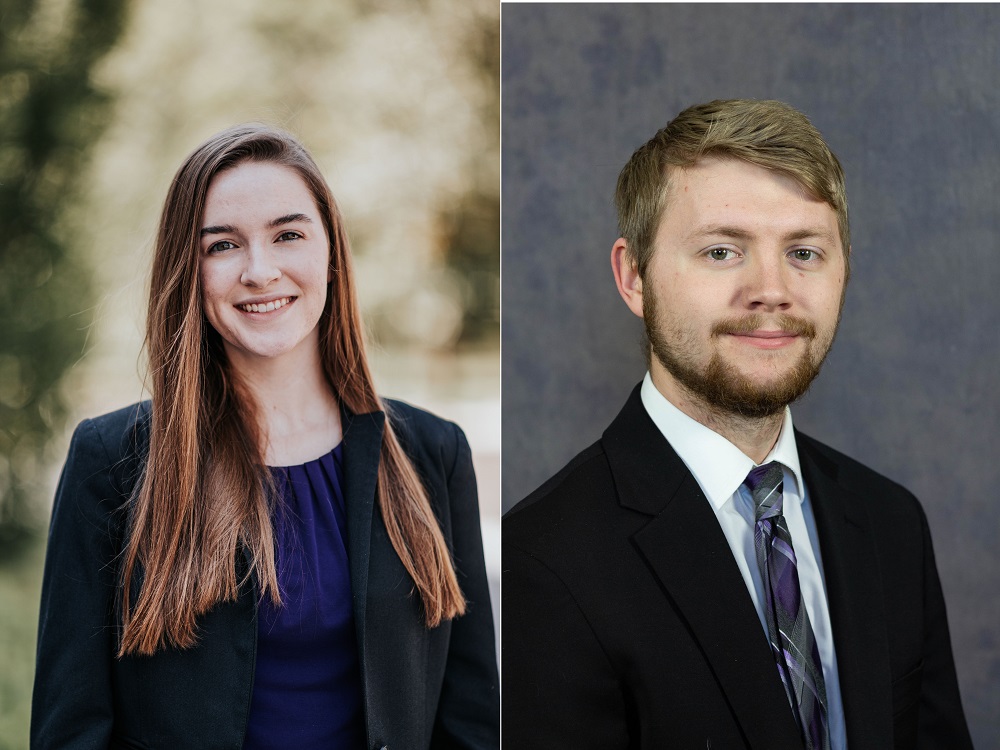K-State Current
K-State Current - February 16, 2022
K-State Current is a weekly news update for the Kansas Board of Regents to apprise the Regents on a few of the many successes and achievements made by K-State faculty, staff and students.

K-State News
All In for K-State: Kansas State University to host 3rd day of giving in support of mental health services for students
 March 23, Kansas State University will host its third All In for K-State day of giving with the bold objective to increase access to mental health services for K-State students. During last year’s All In for K-State, more than $500,000 was raised in one day to help students save money on textbooks. This year, K-Staters and friends are invited to go All In for K-State to reduce the stigma of mental health and raise awareness of essential mental health resources at K-State. Funds raised will support K-State’s Counseling and Psychological Services and the Morrison Family Center for Student Well-being.
March 23, Kansas State University will host its third All In for K-State day of giving with the bold objective to increase access to mental health services for K-State students. During last year’s All In for K-State, more than $500,000 was raised in one day to help students save money on textbooks. This year, K-Staters and friends are invited to go All In for K-State to reduce the stigma of mental health and raise awareness of essential mental health resources at K-State. Funds raised will support K-State’s Counseling and Psychological Services and the Morrison Family Center for Student Well-being.
“There’s a strong connection between a student’s sense of well-being and their academic success,” said Thomas Lane, vice president for student life and dean of students. “If a student is struggling with mental or physical health, or financial or social well-being, that can negatively affect their academic success.”
One-quarter of all U.S. college students have seriously considered suicide, and K-State is no exception. Of K-State students surveyed during the spring 2020 semester and prior to the pandemic, 26% said they’d seriously considered committing suicide at some point. In that same survey, 16% of students said they’d made a plan or had attempted to end their lives. Fifty-seven percent of students surveyed in spring 2020 said they’d felt hopeless sometime in the last 30 days.
“One of the hidden benefits of using therapeutic services in college is the long-term benefits it ends up having later in life,” said Dr. Kodee Walls, assistant director of Counseling and Psychological Services (CAPS) at K-State. “Just as you have an exercise routine for physical health, developing skills and habits around mental wellness ends up making you a more functional adult, a better professional, partner and family member when raising the next generation. Research suggests that when you get therapy at a younger age, you have a lower likelihood of developing more significant mental health issues later.”
The COVID-19 pandemic has exacerbated mental health issues for many. Since 2019, K-State’s CAPS has seen a 27% increase in use of their services.
“We are thankful for the extraordinary generosity K-State alumni, family and friends have consistently demonstrated in their desire to accomplish a significant philanthropic objective in one day. This year the K-State family has the opportunity to invest in life-transforming mental health resources for students,” said Greg Willems, president and CEO of the KSU Foundation. “This March 23, we invite all K-Staters to join our third All In for K-State day of giving. With the focus on students’ mental health resources, your generous K-State spirit has the power to save lives.”
With donors’ support, K-State can expand student access to critical mental health services, increase educational and outreach programs, reduce the stigma surrounding mental health issues, and ultimately, help students flourish.
Visit allin.ksufoundation.org to learn more about All In for K-State and increasing access to mental health services for K-State students.
As Kansas State University’s strategic partner for philanthropy, the KSU Foundation inspires and guides philanthropy toward university priorities to boldly advance K-State family. Visit ksufoundation.org for more information.
K-State, John Deere team on remote sensing study
 K-State researchers have teamed with John Deere to test the accuracy of remote sensors on and off combines. (Photo courtesy of John Deere)
K-State researchers have teamed with John Deere to test the accuracy of remote sensors on and off combines. (Photo courtesy of John Deere)
Researchers at Kansas State University and one of the world’s largest manufacturers of agricultural machinery are reporting findings of a project that they say could “fundamentally change” the way farmers manage and market crops.
K-State Research and Extension agronomist Ignacio Ciampitti said the university is working with partners at John Deere to analyze information from remote sensors on and off combines that will ultimately help farmers improve grain protein in crops.
“Our customers tell us that maximizing grain yield and quality is very important,” said Yancy Wright, the business agronomy test lead with John Deere, a Fortune 500 company. “End users – including millers, livestock feeding operations and other processors – need high quality grain crops, and market premiums are beginning to reflect this demand.
“We wanted to validate our current technology development, and discover new approaches to consider as we develop solutions for helping customers maximize their yield and quality, especially grain protein.”
In a paper published in late 2021 in the journal, Remote Sensing, the researchers outline their analysis of 84 studies on the accuracy of models that predict grain content in a field crop based on current technology, such as satellite imagery.
Ciampitti said the team was able to compare areas of farm fields before harvest using hand-held sensors, drones or planes; then after harvest using sensors attached to the combine.
With that information, they compared areas of the field rated as low quality or high quality for grain protein concentration, and determined where there was variation in the quality of crops after harvest.
“This is an emerging area of research,” Ciampitti said. “Field crop quality differentiation is becoming important to understand, and can increase the competitiveness of U.S. crops entering both local and international supply chains and markets.”
Ciampitti said the analysis showed that on-combine sensors are more accurate than remote sensors in predicting grain protein concentration, though off-combine sensors performed better for in-season management and segregated harvest planning; and cost less to implement.
“However,” he adds, “on-combine sensors may quickly become the gold standard for predicting in-season grain protein concentration.”
According to the researcher’s recent journal article, a recent survey of 186 soybean farmers from multiple states indicated that more than 55% of them would invest in technology to assess grain protein concentration if they could earn a $.50 premium per bushel. Because of that, the researchers say, “farmer interest is expected to increase as both the direct and indirect benefits of (grain protein concentration) become more evident.”
“As we introduce on-combine grain protein concentration data collection technologies, we will look to this work to understand how we might carry out some of the proposed uses for this new data layer with internal solutions and via partnerships, which will help us bring maximum value to customers who adopt these technologies,” Wright said.
“This work,” he added, “will direct technology development that will fundamentally change the way growers manage their harvest and grain marketing, as well as how they manage their crop inputs.”
Ciampitti said the university is moving forward with developing a remote sensing “decision tool” to differentiate spatial variation in field crop quality before harvest that will help farmers make decisions prior to harvest and marketing their crop.
“In addition, we are working with crop commodity boards to start collecting field data in order to create one of the largest farmer-centric databases on field crop spatial variation related to the quality of U.S. crops,” Ciampitti said. “This is happening in collaboration with many other states and in close partnership with farmers across the country.”
K-State’s team included Ciampitti as principal investigator; agricultural engineer Ajay Sharda (co-principal investigator); Leonardo Bastos (now at the University of Georgia); and Andre Froes De Borja Reis (now at Louisiana State University).
The researchers’ full study is available to view online.
K-State Faculty Highlights
K-State Student News
College of Business students receive scholarships from Kansas City supply chain organization
 Two Kansas State University College of Business students, Samantha Brethour and Brandon York, are the recipients of 2021 scholarships from the Kansas City Council of Supply Chain Management Professionals.
Two Kansas State University College of Business students, Samantha Brethour and Brandon York, are the recipients of 2021 scholarships from the Kansas City Council of Supply Chain Management Professionals.
The scholarship recognizes currently enrolled students with a major or minor in supply chain management, operations, logistics, or related educational programs who demonstrate the potential to become future leaders in the supply management field.
Brethour is a junior in the operations and supply chain management track of the management program.
"The supply chain industry has experienced so much turmoil since the beginning of the pandemic, and we have been able to witness the incredible inefficiencies that impact us daily," Brethour said. "Here at K-State, I am learning to think critically about how to manage these disruptions using innovative solutions. I am very grateful for the Kansas City Council of Supply Management Professionals’ generous scholarship to further my education within this field as I prepare to make a difference in the supply chain industry."
York is in the Master of Business Administration program, with a concentration in supply chain management.
"I became interested in pursuing my MBA at K-State because supply chain management plays such an important role in our lives — we rely on our supply chains to deliver food, medicine, water, etc. — so many aspects of our health and well-being," York said. "This scholarship allows me to continue my education in operations and supply chain management and will eventually lead me to a career as a supply chain manager."
"I am proud of our students for receiving these prestigious scholarships," said Myung Kyo "MK" Kim, associate professor in the Department of Management. "The Kansas City Council of Supply Chain Management Professionals has been an invaluable partner and supporter of our operations and supply chain management program and continues to invest in our students’ futures."
The COVID-19 pandemic has driven the nationwide demand for supply chain talent to nearly unprecedented levels. This trend is evident in the Midwest, a focal point for the country’s movement and distribution of goods. As a result, the College of Business has strengthened curriculum offerings to meet the emerging needs of its industry partners and gained recognition from corporate partners and other key industry stakeholders. With significant enrollment growth in recent years, the College of Business plans to offer operations and supply chain management as an independent undergraduate major and undergraduate certificate starting in fall 2022. MBA students can take a series of courses that allow them to develop expertise in supply chain management.
Visit cba.k-state.edu/academics/undergraduate/management.html to learn about the management program and its tracks, which include operations and supply chain management. To learn about the Master of Business Administration program, visit cba.k-state.edu/academics/graduate/mba/.

 A robust defense of our nation's power grid is as important as ever as cyber-data attacks become more sophisticated and common. Enhancing the resiliency of cyber-physical power grids under such attacks and providing system operators the tools they need to enhance situational awareness is essential.
A robust defense of our nation's power grid is as important as ever as cyber-data attacks become more sophisticated and common. Enhancing the resiliency of cyber-physical power grids under such attacks and providing system operators the tools they need to enhance situational awareness is essential.